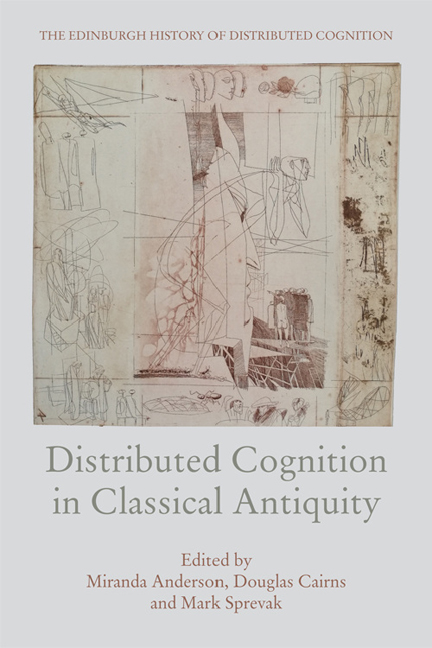Book contents
- Frontmatter
- Contents
- List of Illustrations
- Series Preface
- Miscellaneous Frontmatter
- 1 Distributed Cognition and the Humanities
- 2 Distributed Cognition and the Classics
- 3 Physical Sciences: Ptolemy's Extended Mind
- 4 Distributed Cognition and the Diffusion of Information Technologies in the Roman World
- 5 Mask as Mind Tool: A Methodology of Material Engagement
- 6 Embodied, Extended and Distributed Cognition in Roman Technical Practice
- 7 Roman-period Theatres as Distributed Cognitive Micro-ecologies
- 8 Cognition, Emotions and the Feeling Body in the Hippocratic Corpus
- 9 Enactivism and Embodied Cognition in Stoicism and Plato's Timaeus
- 10 Enargeia, Enactivism and the Ancient Readerly Imagination
- 11 Group Minds in Classical Athens? Chorus and Dēmos as Case Studies of Collective Cognition
- 12 One Soul in Two Bodies: Distributed Cognition and Ancient Greek Friendship
- 13 Distributed Cognition and its Discontents: A Dialogue across History and Artistic Genre
- Notes on Contributors
- Bibliography
- Index
4 - Distributed Cognition and the Diffusion of Information Technologies in the Roman World
Published online by Cambridge University Press: 12 November 2019
- Frontmatter
- Contents
- List of Illustrations
- Series Preface
- Miscellaneous Frontmatter
- 1 Distributed Cognition and the Humanities
- 2 Distributed Cognition and the Classics
- 3 Physical Sciences: Ptolemy's Extended Mind
- 4 Distributed Cognition and the Diffusion of Information Technologies in the Roman World
- 5 Mask as Mind Tool: A Methodology of Material Engagement
- 6 Embodied, Extended and Distributed Cognition in Roman Technical Practice
- 7 Roman-period Theatres as Distributed Cognitive Micro-ecologies
- 8 Cognition, Emotions and the Feeling Body in the Hippocratic Corpus
- 9 Enactivism and Embodied Cognition in Stoicism and Plato's Timaeus
- 10 Enargeia, Enactivism and the Ancient Readerly Imagination
- 11 Group Minds in Classical Athens? Chorus and Dēmos as Case Studies of Collective Cognition
- 12 One Soul in Two Bodies: Distributed Cognition and Ancient Greek Friendship
- 13 Distributed Cognition and its Discontents: A Dialogue across History and Artistic Genre
- Notes on Contributors
- Bibliography
- Index
Summary
This chapter has a somewhat different focus from the majority of the essays in this volume.1 Accepting the truth of the distributedness (in various senses) of cognition, those other essays use that truth to shed new light on a variety of what might be called, in a very broad sense, ancient philosophies of mind, both folk versions and more intellectualised ones. Though beginning from similar assumptions, this chapter does not proceed in that archaeological direction. Rather it argues that modern awareness of distributed cognition is crucial to the causal explanation of historical phenomena that are less theoretical. It is a history that uses the concept, not a history of the concept. (In this respect it is closest to the contributions of Meineck, Roby and, in parts, Short to this volume.) In particular, I suggest that distributed cognition is important to understanding when and how Romans used certain scribal techniques of information organisation.
Some Definitions
The easiest way to explain the scope and aims of this chapter may simply be to gloss several words and phrases in the title. ‘Information technology’ is of course a potentially very broad field, but I mean it here in a fairly abstract sense. Instead of concrete objects, such as the book or the abacus, I will focus on two conceptual devices that I hope will be exemplary – the table and the multiply-nested list. I mean both of these as terms of art, and I will discuss the specific definitions I have in mind below. By ‘Roman world’, I mean principally the Latin-speaking world, rather than all areas that happened to have been under Roman political domination. Though there seem to be broad similarities between ancient Mediterranean societies in information handling, the distribution of specific technologies tends to be language specific. Conventionally, if somewhat arbitrarily, I also limit myself to the pre-Christian empire. Finally, the chapter suggests that ‘cognitive’ factors play a significant role in whether or not these technologies are developed and used in particular contexts. Despite my use of the word ‘conceptual’ above and the formal character of the definitions below, I do not treat the tables and lists as mental abstractions. In fact, a more distributed model of cognition explains their use patterns; they are more successful in environments where there is more ‘scaffolding’, with various material, kinetic and social forms to support them.
- Type
- Chapter
- Information
- Distributed Cognition in Classical Antiquity , pp. 57 - 74Publisher: Edinburgh University PressPrint publication year: 2017



